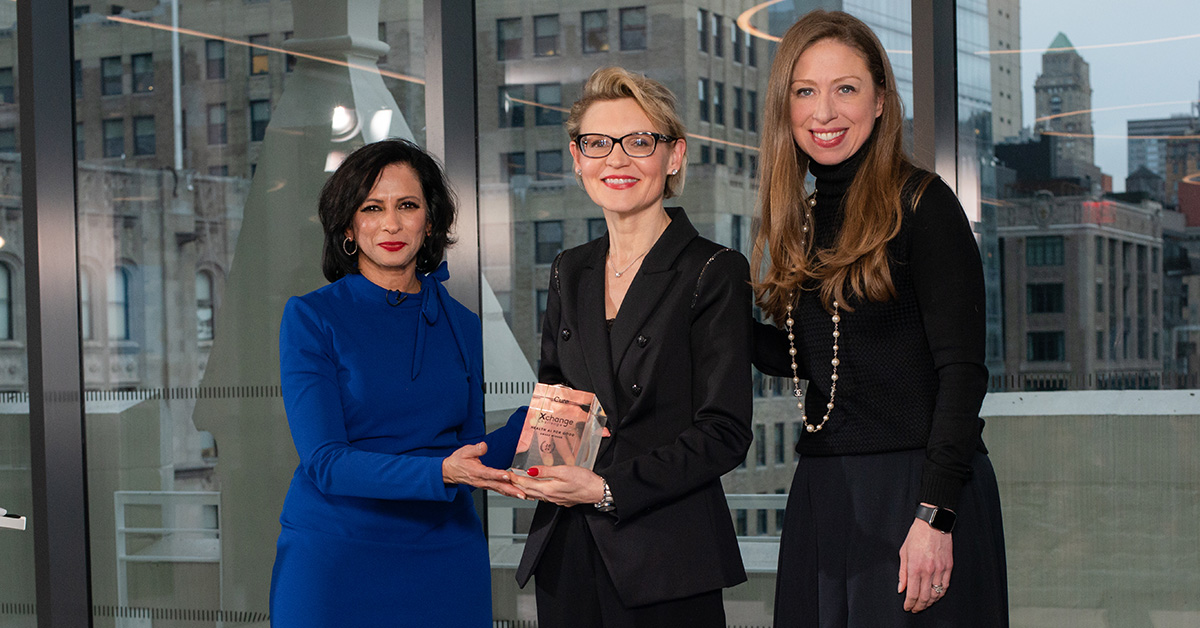Rombel, who cofounded BioCurie with MIT professor Richard Braatz in 2021, was the only woman CEO representing a winning startup on the stage.
In the world of biotech startups, it wasn’t a surprise.
“I was the only one!” Rombel told Technical.ly. “But it’s not unusual.”
Based on her company’s name, it’s probably not surprising that Rombel looked up to the physicist and chemist Marie Curie during her childhood. Growing up in a working-class home with Polish immigrant parents, Rombel saw the Polish-born Curie as a role model. Rombel studied biochemistry, eventually earning a Ph.D. at the University of Otago in New Zealand. She’s been an assistant professor, an investor, a consultant and a senior director of strategic analysis at Johnson & Johnson.
“[At Johnson & Johnson] I saw these life-saving therapies that are really going to transform human life, cure diseases that currently have no treatments,” Rombel said. “But then I realized, these are really, really hard to develop and to produce and, sure enough, they cost a lot of money for the patient, which is not tenable.”
It was the same at Philadelphia-based Spark Therapeutics, where she went on to work as chief of staff for research.
Around that time, Rombel first met Braatz at a NIIMBL (The National Institute for Innovation in Manufacturing Biopharmaceuticals) conference where he was speaking.
“I’d read his research because he developed some of the first AI models for gene therapy production and is a world leader in artificial intelligence for biomanufacturing,” Rombel said. “And he had the same vision that I had.”
Braatz and Rombel decided to join forces and cofound BioCurie to revolutionize cell and gene therapy manufacturing.
“We don’t want to do something that’s just going to be incremental,” Rombel said. “We want to have something that’s really going to impact the industry and our most important patients.”
BioCurie’s proprietary AI-driven technology is called the mAI-BioCurie platform. Instead of empirical experiments in a lab, the software produces a digital twin on which it runs millions of experiments to find solutions faster and ensure consistency in manufacturing. Ultimately, it should reduce the cost of developing therapies, making them more affordable for patients.
“Essentially, we’re developing the first AI-driven software platform to help biopharmaceutical companies and manufacturers figure out the optimal recipe,” Rombel said. “It sounds simple, but it’s so hard.”
As winners of the Cure Exchange Challenge, BioCurie has access to seed funding and is now part of a one-year residency at Cure’s New York City campus incubator.
“We hope to have raised our pre-seed and possibly even our seed round in a year,” Rombel said.
If all goes to plan, BioCurie will forge strategic partnerships and launch its first product by the end of the residency.
Rombel plans to stay in Delaware, where, among other things, she mentors students at Delaware Technical and Community College. The commute to Cure’s campus is less than two hours by train.
“The company is physically based in Wilmington, and Richard is up [in Boston] at MIT,” Rombel said. “So now we’ll have a presence in New York, Greater Philly and right in the heart of Philadelphia.”
With the US Economic Development Administration’s selection of The Greater Philadelphia Region Precision Medicine Tech Hub last fall, BioCurie, which very much fits the definition of precision medicine, is right where it needs to be, Rombel said.
“This is such a great region,” she said. “The first gene therapy came out of CHOP [Children’s Hospital of Philadelphia], the first cell therapy came out of UPenn, the first mRNA vaccine came out of Penn. And then there are all these spinouts, and now there’s us.”
Irene Rombel will give a virtual talk, “Pioneering BioCurie’s Vision,” on LinkedIn Live on March 12 and 12:30 pm, as part of Cure’s Tuesday Talks series.







